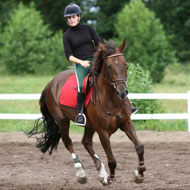
Vikings responsible for starting worldwide distribution
A study by an international research team working under Leibniz Institute for Zoo and Wildlife Research (IZW) in Berlin has revealed the probable origins and development of the worldwide population of gaited horses.
A mutation of the DMRT3 gene was identified as responsible for the more comfortable ambling or pacing gait typical of Icelandic horses, giving a smoother ride particularly suitable for long distances and rough terrain.
To trace the origins of the gaited horse, scientists analysed the genome of 90 horses from the Copper Age (6000 BC) to the Middle Ages (11th century). The mutation was found in samples of two medieval English horses, along with several Icelandic horses dating from the 9th-11th century. The mutation was not found in any other European, or Asian horses from the same time period.
As it is extremely unlikely that the two populations of horses developed the mutation independently, the suggestion is that the gaited horses were imported to Iceland where they were selectively bred for their trait.
Arne Ludwig, geneticist at IZW explains “The Vikings recognised the value of the gaited horses and preferentially selected this trait- thereby laying the foundation for the worldwide distribution.”
Records of Vikings pillaging in the region of today’s Yorkshire, where the two positive English samples originated from, combined with sagas suggesting Icelandic horses exhibited gaited horse traits early on, Ludwig and his team have concluded that “results suggest that Vikings first encountered gaited horses on the British Isles and transported them to Iceland.”



 BSAVA is to partner with BVA Live (11-12 June 2026) to champion clinical research.
BSAVA is to partner with BVA Live (11-12 June 2026) to champion clinical research.